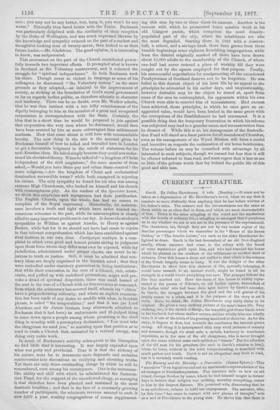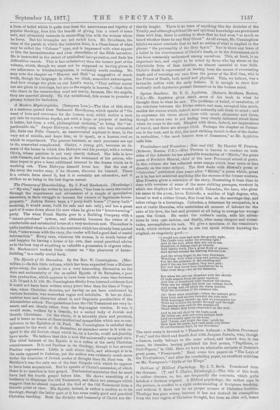The Evening and the Morning : a Narrative. (James Spiers.) — This
" narrative " is an ingenious and not an unattractive representation of the advantages of Swedenborgianism. The narrator tells us how an old friend, George Gordon by name, whom he had himself taught in former days to believe that religion was nothing, morality everything, comes to him in the deepest distress. His promised wife, discovering that he is an unbeliever, refuses to fulfil her engagement. The narrator, who, by this time "has come in contact with new phases of thought," acts as a sort of Providence to the young man. He shows him that there is a form of belief which is quite free from the narrowness and bigotry of popular theology, does him the benefit of giving him a creed of some sort, and ultimately succeeds in reconciling him with the woman whom he loves. But his triumphs are not ended bore. Mr. Broadman, the vicar of the parish in which the historian lives, is a Churchman of what may be called the " Colonso " type, and is impressed with what appear to him the inconsistencies and even absurdities of the Bible narrative. He is instructed in the secret of symbolical interpretation, and finds his difficulties vanish. This is less satisfactory than tho former part of the volume, which, though we must not be supposed as having given in our adherence to Swedenborgianism, is certainly worth reading. We may note the chapter on "Heaven and Hell "as suggestive of much truth, though the language is often, we think, somewhat extravagant. And how strange the gloss on our Lord's words, "They neither marry nor are given in marriage, but are as the angels in heaven,"—that those who share in the resurrection need not marry, because, like the angels, they are married already. To the uninitiated, this seems to promise a gloomy future for bachelors.































 Previous page
Previous page